
Breaking Down Hard Kombucha Myths
There’s a lot of buzz around hard kombucha, and as with any popular trend, myths are bound to emerge. Let’s set the record straight and uncover the truths behind some common misconceptions about this fizzy fermented drink.
Myth #1: Hard Kombucha is Non-Alcoholic
One of the most widespread myths is that hard kombucha is a non-alcoholic beverage. This simply isn’t true. Hard kombucha undergoes a fermentation process that naturally produces alcohol, typically ranging from 3 to 5 percent alcohol by volume (ABV). That’s similar to many beers on the market. Therefore, it’s important to be aware that hard kombucha does contain alcohol and should be consumed responsibly.
Myth #2: Hard Kombucha Doesn’t Offer Any Probiotic Benefits
Another common misconception is that the alcohol content in hard kombucha kills off all the beneficial probiotics that kombucha is known for. While it’s true that alcohol can have an antimicrobial effect, the levels present in hard kombucha are generally not high enough to negate all of its probiotic benefits. However, the probiotic content may be lower than in non-alcoholic kombucha, so keep that in mind when choosing your brew.
Myth #3: Hard Kombucha is for Health Nuts Only
Some people think that hard kombucha is exclusively for those who are deeply invested in health and wellness. In reality, hard kombucha is enjoyed by a wide variety of people who appreciate its unique taste and the alternative it provides to traditional alcoholic beverages. With a variety of flavors and brands, there’s a hard kombucha out there for everyone.
Myth #4: Hard Kombucha Tastes Like Regular Kombucha
While hard kombucha and regular kombucha share a common foundation, the taste can be quite different. The alcohol in hard kombucha can change the flavor profile, often resulting in a drier, less sweet beverage. Additionally, many hard kombuchas are infused with a range of natural ingredients, such as fruits and herbs, which can further differentiate their taste from traditional kombucha.
Myth #5: All Kombuchas Are Created Equal
It’s easy to assume that one kombucha is much like another, but this couldn’t be further from the truth. Each batch of kombucha, whether hard or non-alcoholic, is a world of its own. Factors such as the type of tea used, the sugar content, the specific strains of bacteria and yeast, and the length of fermentation can all influence the final product. This means that the taste, alcohol content, and probiotic benefits can vary greatly from one kombucha to another.
Additionally, the environment in which kombucha is brewed plays a significant role in its development. Temperature, humidity, and even the type of vessel used for fermentation can impact the drink’s characteristics. So, when you’re sipping on a kombucha, remember that it’s a unique living product with its own distinct profile.
The Truth Behind the Buzz
Hard kombucha has been gaining popularity for its purported health benefits and its status as a ‘better-for-you’ alcoholic beverage. But with popularity comes misconceptions. Let’s dive into the facts and demystify the real benefits and content of hard kombucha.
The Real Scoop on Alcohol Content
When it comes to alcohol content, hard kombucha is indeed ‘hard’. Its alcohol levels are achieved through a natural fermentation process that goes beyond the standard kombucha fermentation. This means that while non-alcoholic kombuchas contain less than 0.5% ABV, hard kombuchas can range from 3% to 7% ABV, depending on the brand and brewing method.
The fermentation process of hard kombucha is often extended or modified to encourage higher alcohol production. This process not only increases the alcohol content but can also affect the flavor and carbonation of the drink, leading to a more beer-like experience with the added benefit of probiotics.
Comparing ABV Levels: Kombucha vs. Hard Kombucha
Understanding the difference in alcohol content between kombucha and hard kombucha is essential for making informed choices. Here’s a comparison:
|
Type of Kombucha |
Typical Alcohol Content |
|---|---|
|
Non-Alcoholic Kombucha |
< 0.5% ABV |
|
Traditional Kombucha |
0.5% – 2% ABV |
|
Hard Kombucha |
3% – 7% ABV |
As you can see, the alcohol content in hard kombucha is significantly higher than in non-alcoholic or traditional kombucha. This is why hard kombucha is categorized as an alcoholic drink and should be enjoyed in moderation.
Frequently Asked Questions
Brewing beneath the surface of hard kombucha’s trendy facade are questions that many enthusiasts and newcomers alike are curious about. Let’s answer some of the most common queries.
Can Hard Kombucha Get You Drunk?
With an alcohol content comparable to many beers, hard kombucha can indeed lead to intoxication if consumed in sufficient quantity. It’s important to drink hard kombucha with the same caution you would exercise with any alcoholic beverage. Always be mindful of how much you’re consuming, especially since hard kombucha can be deceptively easy to drink due to its refreshing taste.
Is Hard Kombucha Safe to Drink Every Day?
Like any alcoholic drink, moderation is key when it comes to hard kombucha. While it does contain beneficial probiotics, the presence of alcohol means that daily consumption isn’t advisable. Treat it as you would a beer or glass of wine, enjoying it occasionally rather than as a daily health supplement.
Does Hard Kombucha Contain More Sugar Than Beer or Wine?
Hard kombucha often starts with more sugar than beer or wine to fuel the fermentation process. However, much of this sugar is converted into alcohol and acids, resulting in a lower sugar content in the final product. The residual sugar in hard kombucha can vary, so it’s worth checking the label if you’re watching your sugar intake.
Can Individuals with Dietary Restrictions Enjoy Hard Kombucha?
Many hard kombuchas are gluten-free and made with organic ingredients, making them a suitable option for those with certain dietary restrictions. However, as recipes vary, it’s always best to check the label or contact the manufacturer if you have specific dietary needs or allergies.
Where Can I Find Boochcraft’s Hard Kombucha?
Boochcraft’s hard kombucha is widely available in health food stores, supermarkets, and specialty drink shops. You can also check online retailers or Boochcraft’s own website for availability in your area. Remember to look for the ABV on the label to ensure you’re getting the hard kombucha experience you’re seeking.



